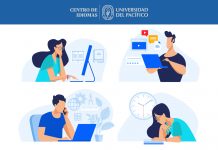Many scholarships to study abroad are unused and wasted because the students who could take advantage of them do not fulfill the language prerequisite. In most cases the language required is English.
Learning a foreign language has become imperative due to globalization. Now, faced with the possibility of being able to communicate with anybody in the world thanks to the advances of technology, more individuals do as much as possible to learn English, today’s lingua franca. Thus, many begin to study it in institutions or try to learn it on their own. In either case, many times the learners find it difficult to achieve their goal as fast as they would like. There are many factors that may hinder their progress. For instance, some do not invest enough time in their lessons after attending classes, probably because they believe that just being present would be enough to learn, disregarding the importance of consolidating what they have done in class so that their cognitive process may integrate the knowledge to which they have been introduced. In other words, they forget, or do not know, that to move the information from short term to long term memory we need to use this common resource called “repetition” which is basically done with a number of exercises suggested by teachers.
Whenever we have doubts about how to improve a certain skill (listening, speaking, reading, writing) or a specific aspect of language such as vocabulary, our teachers always give us a number of tips that can help us boost our acquisition. In the coming set of articles, we will share some of those tips that come handy and prove to be very useful.
Do not forget that the outcome will only become materialized if you commit yourself to invest enough time in practicing persistently.










